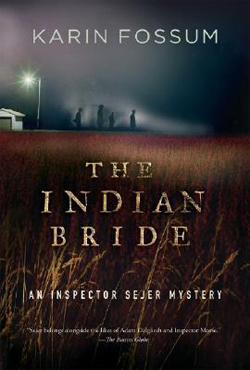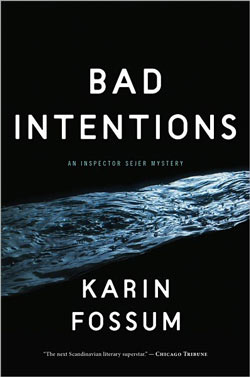
I don’t think I have ever come across a crime writer who evokes such a range of praise and criticism. Many think her writing is awful, whilst others are transfixed by the characterization and stillness in her work.
I’m somewhere in the middle, lying on the supermarket floor.

The bride goes by the name of Poona Bai, which makes no sense. Her first name should be Poonam. Poona is the Anglo name of Pune, a city. And Bai more or less means Mrs., so when her brother pops up with the name Shiraz Bai, I am thinking he is Mrs. Bai. It gets more and more like an Oscar Wilde play, particularly when dragons come and go. Dragons don’t have any resonance in India, so the imagery makes no sense. Yet the book won The Los Angeles Times Book Prize in the mystery/thriller category, which brings my criticism full circle. I can’t disregard her, despite the faults.

Fossum herself has a very human side, too. Interviewed by The Independent, she actually admitted: “I am not a good crime writer. I’m not good with plots…so I have to do something else.” That makes her a winner, for me, in the fiction stakes and the human ones. She is refreshingly honest.
The books, in order, which have unleashed a not very jolly Inspector Sejer on the world are Don’t Look Back, He Who Fears the Wolf, When the Devil Holds the Candle, Calling Out For You (American Translation – The Indian Bride), Black Seconds, The Murder of Harriet Krohn (not yet published in English), The Water’s Edge, Bad Intentions and The Caller.

As far as I am concerned, Bad Intentions is a pivotal book and her work continues to get better and better. She manages to make the unbelievable possible, and that is what good writing is all about. Her ability to bring characters to life is where she shines. She shows their vulnerability and fragility.
There is no doubt, for me, that Fossum captures the essence of Norway. Simple and straightforward, yet dark and not entirely clear at the same time. I lived and worked in Oslo for a while, and I must admit, I left there feeling I never understood the place properly (though I did learn it was only place in the world I could wear incredibly stupid hats without feeling silly or out of place). Fossum’s settings and her characters are absolutely authentic. When I was there, I learnt of the Norwegians’ reluctance to invite you into their homes. When I read these books, I think I got off lightly. (Apart from the hats. I still have those.)
When Karin Fossum comes to promote her books, she can copy Oscar Wilde at customs. When asked if she has anything to declare, she can reply, a la Oscar “Only my magnificence.”
Birch image via Martin Pettitt, edited with permission.
Dirk Robertson is a Scots thriller writer, currently in Virginia where he is promoting literacy and art projects for young gang members. When not writing, tweeting, or blogging on the Mystery Writers of America website, he designs and knits clothes and handbags from recycled rubbish. His next book, The Politics of Murder (The X-Press UK/US) will be published July 31, 2011.
